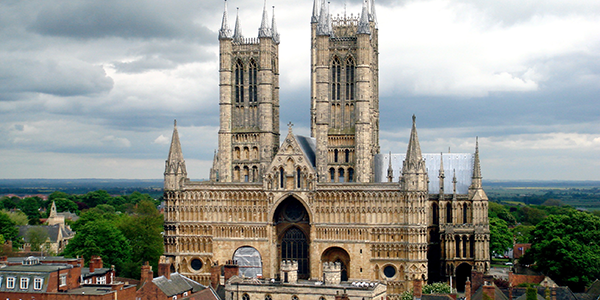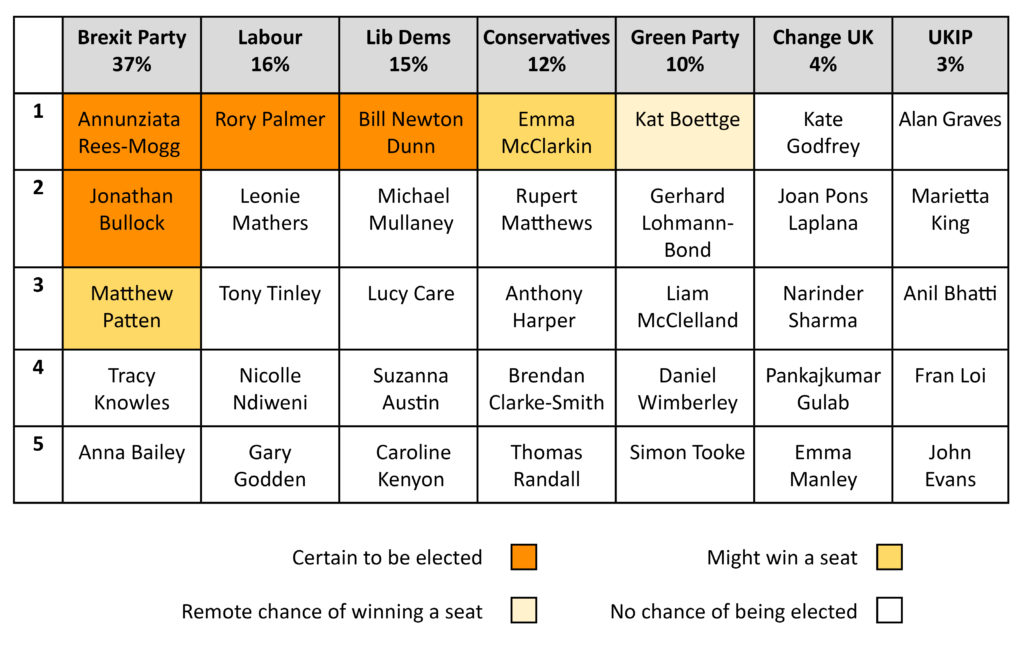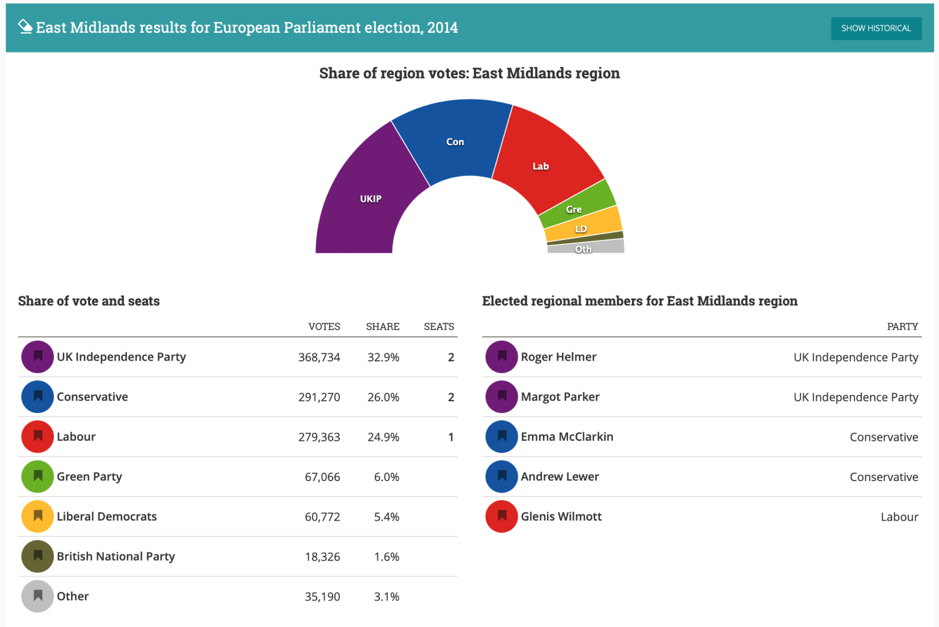European elections 2019: what will happen in the East Midlands?
The East Midlands was a UKIP heartland area during the party’s peak years of 2013–14, and 59% of its voters backed Leave in the Brexit referendum. UKIP topped the poll here in the last European parliament elections, but their supporters have almost all now switched to the Brexit Party. According to the latest polling, they are guaranteed two of the region’s five seats. Labour and the Liberal Democrats are almost certain of a seat each. The last of the region’s five seats will depend on whether the Conservatives’ vote collapse can be stemmed. If not, Farage’s party will likely pick it up. With voters able to cast only a single vote for a party list, the Democratic Audit team reviews likely outcomes and the main potentially electable candidates.

Lincoln Cathedral. Picture: K Bennett from Pixabay
The East Midlands region covers the counties of Derbyshire, Nottinghamshire, Leicestershire, Rutland, Northamptonshire and Lincolnshire. All but two local authority areas in the region voted Leave in the referendum – the exceptions being Leicester and Rushcliffe. In 2014 UKIP won 33% of the vote and elected two MEPs, with the Tories well behind but still picking up two seats.
The extent to which Brexit has cut across traditional party divides is no more evident than in Nottinghamshire and Derbyshire and its MPs. The area hosts famous Tory Remainer Ken Clarke (Rushcliffe), and Labour Leavers Dennis Skinner (Bolsover) and John Mann (Bassetlaw). Ashfield’s MP Gloria de Piero campaigned for Remain in the 2016 referendum, but now is highly critical of any attempt to remain in the EU. Meanwhile, Nottinghamshire MPs Anna Soubry (Broxtowe) and Chris Leslie (Nottingham East) both left their respective parties to form the pro-Remain Change UK party.
Initial European Parliament polling by ComRes in early May put Labour and the Brexit Party on top here on 27% and 26%, respectively, but a YouGov poll in mid-May indicates that in recent weeks the Brexit Party has surged into a commanding lead with 37%, while Labour and Conservative votes are haemorrhaging away. Figure 1 shows that these recent numbers would mean the Brexit Party is guaranteed to secure two MEPs, including their number one candidate, Annunziata Rees-Mogg, who is MP Jacob Rees-Mogg’s sister. Depending on exactly how strong their support is on the day, they could well win a third seat.
Labour are still second on YouGov figures, but at 16% they are down 10% on their 2014 vote share. Their top candidate should be assured of a seat, but the party’s earlier hopes of winning two MEPs now look unrealisable. Part of Labour’s troubles stem from losing strong Eurosceptic voters’ support, but part also reflects the renaissance of the Liberal Democrats in this region as a strong pro-Remain party, capitalising on Labour’s ambivalence, and buoyed by good local election results. Polls in early May already put Lib Dem support up at 15% and the YouGov poll confirms this. That makes them by far the strongest of the pro-Remain parties and should be enough to see them win one seat here.
The Tories were polling at 17% in early May, which would already see them losing one of their seats. But YouGov has them slipping further to 12% – a level that risks their top candidate (incumbent MEP Emma McClarkin) losing out completely and instead the Brexit Party winning the region’s final seat, to give them a third MEP. The Conservatives will have to hope that their supporters will be more resilient and turn out more on the day, despite the depressing mood music from the government’s travails.
Also chasing hard for the last seat are the Greens, the second pro-Remain party in with some chance. They were polling at 5% in early May, but have doubled this level in the more recent YouGov poll. As Green support has grown, Change UK has fallen in the polls, but the Greens would still need a further substantial increment (of around 3%) to be in serious contention for a seat. Some earlier polls put Change UK higher, but their support now seems to have settled back down to a low level that puts them out of the running here.
Finally, UKIP are polling at 3%, giving them no chance of winning a seat here, and of course representing a catastrophic fall from last time around.
With only five seats available, the East Midlands’ ballot paper is not as large as in some other regions. However, most of the lower ranked candidates for each party cannot possibly win a seat under proportional representation. (For a full candidate list of all parties and independents see here.) Voters can only vote for a single party list, not specific candidates, and must mark a single X on the ballot paper. In making up their minds which party list to support, voters need only pay attention to the ten candidates in the shaded boxes here.
Figure 1: Main party candidates in the East Midlands region (with YouGov poll 8–17 May) and possible winners (five seats)

YouGov poll, 8–17 May, weighted by likelihood to vote, excluding those who would not vote, don’t know or refused
To find details of all the local candidates, and to locate your polling station, visit our Democratic Dashboard site and enter your postcode. The site also has full details of other recent elections in your local area.
Below we list a summary of any candidate in Figure 1 with some chance of being elected, and point you to their social media sites. At the bottom of this article we also show the full 2014 results for the East Midlands.
Which candidates can win seats in the East Midlands in 2019?
BREXIT PARTY are apparently surging in the region, with Annunziata Rees-Mogg and sitting MEP Jonathan Bullock (formerly of UKIP) both certain to win seats. The party also needs only another wafer increment to become sure of winning a third seat.
- Annunziata Rees-Mogg (Twitter: @zatzi) is a journalist, former Conservative parliamentary candidate in Somerset, and sister of prominent Tory backbench MP Jacob Rees-Mogg.
- Jonathan Bullock is a sitting MEP, originally elected as a UKIP member. Bullock has a background in advertising and logistics. You can read more about him here. For his European Parliament voting record, see his Votewatch.eu profile here.
- Matthew Patten (Twitter: @mathpatten) is a former director of the Mayor’s Fund for London charity. Patten had previously held various positions in the charity sector.
LABOUR are pretty sure to retain their one seat in the region. Earlier in the campaign they could have hoped to see their top two candidates elected – but there seems no chance of this now.
- Rory Palmer (Twitter: @Rory_Palmer) is a sitting MEP. He was the first deputy city mayor in Leicester, and was a city councillor in Leicester for ten years. For his European Parliament voting record, see his Votewatch.eu profile here.
- Leonie Mathers (Twitter: @leoniemathers) works at a university and has worked for two Labour MPs previously.
LIBERAL DEMOCRATS lost their seat in the region in 2014. But the same candidate, Bill Newton Dunn, now looks on course to win a seat. However, unless numerous strongly pro-Remain voters rally behind the party their second candidate currently has no chance.
- Bill Newton Dunn (Twitter: @billnewtondunn) was the UK’s longest serving MEP, having been a Liberal Democrat MEP between 2000 and 2014, and a Conservative MEP prior to this. Newton Dunn switched parties over the Tories’ increased Euroscepticism.
- Michael Mullaney (Twitter: @miketmullaney) is a councillor in Leicestershire, and the Lib Dem parliamentary candidate in Hinckley and Bosworth.
CONSERVATIVES have drop from second place in this region or fourth. One of their incumbent MEPs (McClarkin) might retain her seat on current polling, but the party has no chance of retaining the second (Matthews) on current polling.
- Emma McClarkin. (Twitter: @EmmaMcClarkin) was elected as an MEP in 2009. For her voting record, see Votewatch.eu here. Previously she worked for the party and in the sporting sector.
- Rupert Matthews was actually third on the Tories list in 2014 and he only entered the European Parliament in 2017, when the former MEP stood down. For his voting record, see Votewatch.eu here. He campaigned with Better Off Out.
GREEN PARTY has risen in recent polls, but their support is still short of the level they need to win the last seat in the region.
- Kat Boettge (Twitter: @KatBoettge) is a town councillor in Kimberley.
CHANGE UK on just 4% do not likely to win any seat in the East Midlands.
- Kate Godfrey (Twitter: @remainwithkate) campaigned for Remain during the 2016 Brexit referendum, and was a Labour parliamentary candidate. She previously carried out research in the Middle East for the EU, UNDP, and World Bank. Read more about Godfrey here.
UKIP’s support has drained away to Farage’s party, as elsewhere across the country.
- Alan Graves (Twitter: @alanukip) is UKIP’s regional chairman, and a councillor in Derby.
Figure 2: 2014 European Parliament Election results for the East Midlands

Source: Democratic Dashboard. Order of election: 1. Jonathan Bullock (replaced Roger Helmer for UKIP, but has now defected to the Brexit Party); 2 Emma McClarkin (Conservative), 3 Rory Palmer (Labour; replaced Glenis Willmott); 4. Margot Parker (UKIP), 5. Rupert Matthews (Conservative; replaced Andrew Lewer).
Read more about how the European Parliament elections work:





 Democratic Audit's core funding is provided by the Joseph Rowntree Charitable Trust. Additional funding is provided by the London School of Economics.
Democratic Audit's core funding is provided by the Joseph Rowntree Charitable Trust. Additional funding is provided by the London School of Economics.
Dennis Skinner MP for Bolsover is in Derbyshire not Nottinghamshire.
The extent to which Brexit has cut across traditional party divides is no more evident than in Nottinghamshire and its MPs. The county hosts famous Tory Remainer Ken Clarke (Rushcliffe), and Labour Leavers Dennis Skinner (Bolsover) and John Mann (Bassetlaw). Ashfield’s MP Gloria de Piero campaigned for Remain in the 2016 referendum, but now is highly critical of any attempt to remain in the EU. Meanwhile, Nottinghamshire MPs Anna Soubry (Broxtowe) and Chris Leslie (Nottingham East) both left their respective parties to form the pro-Remain Change UK party.
Thanks. Corrected now.